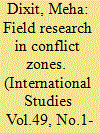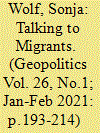| Srl | Item |
| 1 |
ID:
134108


|
|
|
|
|
| Publication |
2012.
|
| Summary/Abstract |
This paper focuses on conducting research in conflict or post-conflict areas and dilemmas faced by researchers when visiting these places. It outlines some of the practical, methodological, normative and ethical issues that may engulf a researcher's mind prior to or while visiting these areas. These include access to the conflict zone, the insider/outsider debate, the feasibility of interviewing civilians and armed combatants, informed consent of the locals, the importance of the socio-cultural context, distinction between victims and perpetrators of violence, assessing trauma in conflict and post-conflict zones, and expectations of the locals. The attempt to highlight these issues does not imply that these are the only questions of concern while conducting research in conflict or post-conflict zones. However, these issues relate to the experiences of the author while travelling to such areas.
|
|
|
|
|
|
|
|
|
|
|
|
|
|
|
|
| 2 |
ID:
179519


|
|
|
|
|
| Summary/Abstract |
Individuals and families are being displaced from the Northern Triangle of Central America by structural and physical violence. Clandestine migration increases the invisibility of forced migrants and makes them difficult to access for researchers. Gatekeepers perceive or depict forced migrants as vulnerable populations and often deny investigators access to them, arguing that traumatised people should not be asked to retell their stories and be revictimised. The growing literature on research participation suggests that individuals categorised as vulnerable often decide to collaborate in studies, because they welcome the opportunity to talk about their experience to an empathetic listener and to help improve policies and services. Immediate distress produced by revisiting painful moments in life often dissipates quickly and is outweighed by the benefits of research participation, such as feelings of catharsis and a sense of acknowledgement and purpose. When gatekeepers deny investigators access to vulnerable population groups, they preclude them from autonomously deciding whether to grant or withhold informed consent and from exercising their right to participate in research. Their invisibilities and silences render migrants more susceptible to human rights violations. Taking protection seriously means widening the research participation of vulnerable individuals.
|
|
|
|
|
|
|
|
|
|
|
|
|
|
|
|
| 3 |
ID:
180662


|
|
|
|
|
| Summary/Abstract |
Researchers working in Central Asia often report difficulty obtaining Western-style signed informed consent statements. The principles underlying informed consent were developed in cultures characterized by low-power distance and individualism, low context communication and a rules basis, whereas many Central Asian cultures emphasize high-power distance, collectivism, high-context communication and relationships. Yet, consent is an important principle. We interviewed scholars who grew up in Central Asia, but completed graduate work in the United States, Canada or the UK, to ask their recommendations for developing a culturally appropriate consent process. The common themes that arose include working within a network, building relationships of trust with potential participants and not utilizing legal-type documentation as a basis for consent.
|
|
|
|
|
|
|
|
|
|
|
|
|
|
|
|